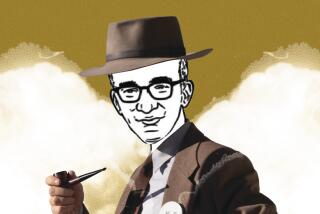Review: ‘Be Natural: The Untold Story of Alice Guy-Blaché’ sheds light on the first female film director
The fragility and fallibility of history is on display in the illuminating documentary “Be Natural: The Untold Story of Alice Guy-Blaché,” directed by Pamela B. Green. Early in the film, Green asks a host of Hollywood elites — directors, producers, writers — if they’ve ever heard of Alice Guy-Blaché, the first female film director. Almost uniformly, they respond in the negative, and Green’s film, produced and narrated by Jodie Foster, dives deep into the frustrating mystery of why Guy-Blaché has been nearly erased from film history, while also seeking to correct the record.
This biographical documentary quickly details the facts of Guy-Blaché’s early life in Paris. As a young secretary working for Léon Gaumont, she was the first person to suggest using the new camera and projection technology to film narrative stories, rather than simply documenting real life.
For the record:
7:55 p.m. Nov. 27, 2018The review misstates the year and location Guy-Blaché began running her own studio. It was 1910, not 1908, and it was initially located in Flushing, N.Y., before moving to Fort Lee, N.J. in 1912. Also, a biker identified as Bob is the widower of Guy-Blaché’s granddaughter, not great-granddaughter. Finally, narrator Jodie Foster is an executive producer on the film, not a producer.This article was originally published Nov. 20 at 2:15 p.m.
Guy-Blaché started writing and directing her own films, starting with “The Cabbage Fairy” in 1896. Known for her inventive camera and editing techniques, incisive cultural commentary and excellent humor, she was quickly named the head of production at Gaumont. She influenced young Sergei Eisenstein and later Alfred Hitchcock, and by 1908 she was running her own movie production studio, Solax, in Fort Lee, N.J.
So why on earth was this pioneering filmmaker, who essentially came up with the idea for cinema as we know it, lost to the annals of time? Why isn’t her name as ubiquitous as Lumière or Méliès or Edison? Green is like a dog with a bone when it comes to this mystery, finding anyone and everyone somewhat connected to Guy-Blaché. She tracks down trinkets in the garage of a biker named Bob, the widower of Guy-Blaché’s great-granddaughter. She Skypes with a family tree’s worth of cousins related to one of Guy-Blaché’s cameramen, and interviews seemingly every film professor, historian and preservationist in the state of California.
What starts as a biography turns into a detective thriller as Green crisscrosses the globe, searching for clues as to why Guy-Blaché has been forgotten. The answer: men, mostly. The Depression hit, her philandering husband Herbert ran off to Hollywood, and Guy-Blaché retreated with her children to France, where the newly industrialized film business wasn’t welcoming to an older woman who’d been in America for over a decade. World wars didn’t help the archival process, male interviewers didn’t track her down and Guy-Blaché didn’t get a chance to search for her films until the 1950s, after many were already lost.
While some historians sought to preserve Guy-Blaché’s name and influence, all too many miscredited her work and wrote her out of history. Green’s film serves as an incredibly necessary tonic, reestablishing the prominent role of women at the advent of cinema, when anything was possible, and there was no notion that directing was necessarily a “man’s job.” As Hollywood grapples with its representational issues, it’s vital to restore a history that places women behind the camera. It’s shocking and sad to realize the ways that Guy-Blaché has been overlooked, but “Be Natural,” so named after the signs the director would hang in her studio, is an important step in rewriting that fluid history.
The good news, which “Be Natural” doesn’t mention, is that, perhaps in part thanks to the massive hunt, restoration and preservation efforts detailed in the documentary, 14 of Guy-Blaché’s films are now included on a massive new DVD box-set from Kino Lorber, “Pioneers: First Women Filmmakers,” and also includes films by Lois Weber, Helen Holmes, Mabel Normand, Grace Cunard and Dorothy Davenport Reid.
-------------
‘Be Natural: The Untold Story of Alice Guy-Blaché’
Not rated
Running time: 1 hour, 43 minutes
Playing: Starts April 19, Laemmle Monica Film Center, Santa Monica
------------
See the most-read stories in Entertainment this hour »
Movie Trailers
More to Read
Only good movies
Get the Indie Focus newsletter, Mark Olsen's weekly guide to the world of cinema.
You may occasionally receive promotional content from the Los Angeles Times.






